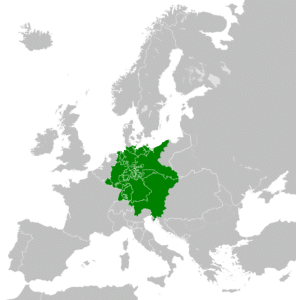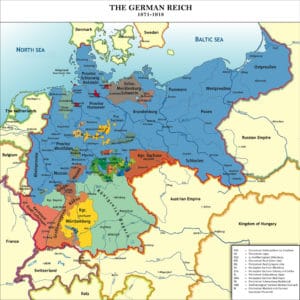From 1740, dualism between the Austrian Habsburg Monarchy and the Kingdom of Prussia dominated German history. In 1772, 1793, and 1795, Prussia and Austria, along with the Russian Empire, agreed to the Partitions of Poland. During the period of the French Revolutionary Wars, the Napoleonic era and the subsequent final meeting of the Imperial Diet, most of the Free Imperial Cities were annexed by dynastic territories; the ecclesiastical territories were secularized and annexed. In 1806 the Imperium was dissolved; France, Russia, Prussia and the Habsburgs (Austria) competed for hegemony in the German states during the Napoleonic Wars.
German Confederation and Empire:
Following the fall of Napoleon, the Congress of Vienna founded the German Confederation, a loose league of 39 sovereign states.

The appointment of the Emperor of Austria as the permanent president reflected the Congress’s rejection of Prussia’s rising influence. Disagreement within restoration politics partly led to the rise of liberal movements, followed by new measures of repression by Austrian statesman Metternich. The Zollverein, a tariff union, furthered economic unity. In light of revolutionary movements in Europe, intellectuals and commoners started the Revolutions of 1848 in the German states. King Frederick William IV of Prussia was offered the title of Emperor, but with a loss of power; he rejected the crown and the proposed constitution, a temporary setback for the movement.
King William I appointed Otto von Bismarck as the Minister President of Prussia in 1862. Bismarck successfully concluded war on Denmark; the subsequent decisive Prussian victory in the Austro-Prussian War of 1866 enabled him to create the North German Confederation which excluded Austria. After the French defeat in the Franco-Prussian War, the German princes proclaimed the founding of the German Empire in 1871. Prussia was the dominant constituent state of the new empire; the King of Prussia ruled as its Kaiser, and Berlin became its capital.
In the Gründerzeit period following the unification of Germany, Bismarck’s foreign policy as Chancellor of Germany secured Germany’s position as a great nation by forging alliances and avoiding war.

However, under Wilhelm II, Germany took an imperialistic course, leading to friction with neighboring countries. A dual alliance was created with the multinational realm of Austria-Hungary; the Triple Alliance of 1882 included Italy. Britain, France and Russia also concluded alliances to protect against Habsburg interference with Russian interests in the Balkans or German interference against France. At the Berlin Conference in 1884, Germany claimed several colonies including German East Africa, German South West Africa, Togoland, and Kamerun. Later, Germany further expanded its colonial empire to include holdings in the Pacific and China. In what became known as the “First Genocide of the Twentieth Century”, the colonial government in South West Africa (present-day Namibia) ordered the annihilation of the local Herero and Namaqua peoples, as punishment for an uprising.
The assassination of Austria’s crown prince on 28 June 1914 provided the pretext for the Austrian Empire to attack Serbia and trigger World War I.
